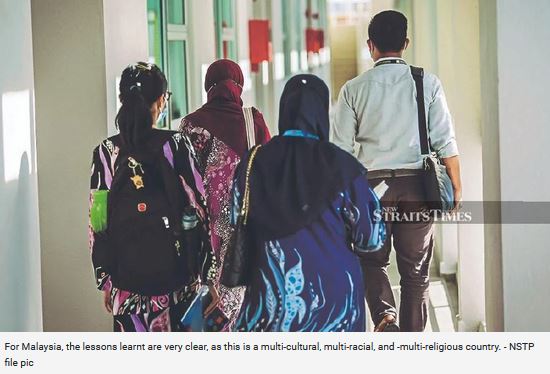Learning experience of students is enriched by diversity
Emeritus Professor Tan Sri Dato' Dzulkifli Abdul Razak
Opinion - New Straits Times
November 8, 2022
The issue of diversity (or the lack of it) has been raging in the local education scene, both in schools and universities.
The issue is not new, nor isolated.
Harvard is also being plagued with similar issues going back years ago, and has "vigorously defended admissions that consider race as one factor among many in arguments before the Supreme Court" at the end of last month.
This, allegedly, has the support of students in the United States rallying for the race-conscious admission policy.
Under the banner "Defend Diversity", for example, they resonate with speakers from civil rights and affirmative action advocacy groups. Signs reading "Affirmative Action Is Not Checking a Box" and "We Will Not Be Used" were among those directed to cases brought by "a critic of affirmative action" and his group, Students for Fair Admissions.
Their allegation? It is "unconstitutional to allow institutions of higher education to consider race as one factor among many in evaluating applicants".
Instead, students were encouraged to "fight for race-conscious admissions and for support of students of colour."
Meanwhile, the Harvard president (equivalent to Vice-Chancellor), writing to the wider community about his personal views on the subject, explained:
"Whatever promise we hold as individuals — for ourselves and for our world — is not predicated on narrowly structured measures of academic distinction.
"When Harvard assembles a class of undergraduates, it matters that they come from different social, economic, geographical, racial, and ethnic backgrounds.
"It matters that they come to our campus with varied academic interests and skill sets.
"Research and lived experience teach us that each student's learning experience is enriched by encountering classmates who grew up in different circumstances."
In addition, the Dean of the Faculty of Arts and Sciences said in a message to Harvard's faculty and staff: "…Our institutional commitment to nurturing a thriving and diverse intellectual community remains unchanged. It is essential to who we are, to the mission that we are here together to pursue, and our academic excellence depends on it. No matter the outcome (of the court's decision), the work of that institutional imperative will continue."
In other words, in a country like Malaysia where ethnicity matters, universities must maintain a campus milieu that enables education to progress beyond mere stereotypes to prepare for the next generation of future-proof global effective citizens and leaders.
Perhaps, what is ultimately most important is the impact on the students, such as Ayah al-Zubi, who when asked what she would want the court to think about before reaching a decision on Harvard's case said: "I really hope they recognise that what makes this nation beautiful is the diversity that exists within it, and when we come together and celebrate all the beautiful ways that we exist with our cultures and languages, we'll only grow forward together as a country."
This can never be better learnt than from the recent pandemic.
We must be ready for a future with a diverse population that represents humanity in diverse ecosystems which are separated, but interlinked and not isolated or siloed.
That is the only way to ensure an effective public protection system and the removal of inequities and disparities throughout humanity.
Indeed, in every other system that connects human civilisation together, including education within the framework Sustainable Development Goals and Agenda 2030, all lives matter.
For Malaysia, the lessons learnt are very clear, as this is a multi-cultural, multi-racial, and -multi-religious country.
Without a deeper appreciation of these factors, universities cannot maintain a campus ecosystem that motivates teaching and learning beyond conventional skill sets which don't prepare a student to be able to cope emotionally, and be a resilient person spiritually.
That is the crux of the balanced and harmonious insan sejahtera in helping to nurture an evolvingly interdependent and sustainable world.
The writer, an NST columnist for more than 20 years, is International Islamic University Malaysia rector
The views expressed in this article are the author's own and do not necessarily reflect those of the New Straits Times

